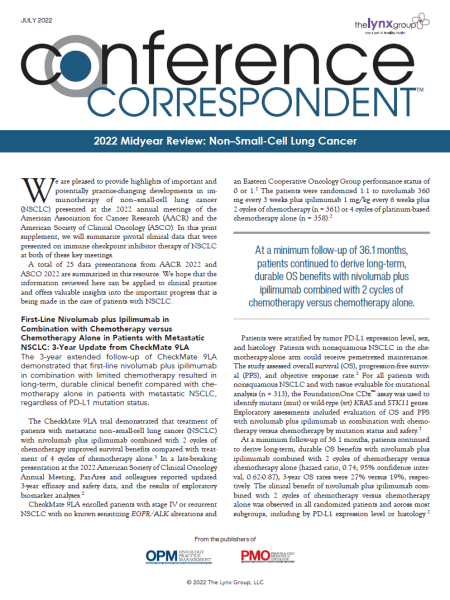Combining nivolumab plus ipilimumab with a limited course of chemotherapy in first-line advanced NSCLC extends overall survival.
The combination of nivolumab (Opdivo) plus ipilimumab (Yervoy) has demonstrated improved overall survival (OS) versus chemotherapy in treatment-naïve patients with advanced NSCLC in CheckMate-227 part 1, regardless of programmed cell death-ligand 1 (PD-L1) expression.1 Researchers hypothesized that a limited course of chemotherapy added to the combination could provide rapid disease control and enhance the durable OS benefit seen with the programmed cell death-1 (PD-1) and CTLA-4 inhibitor combination.2 CheckMate-9LA is a phase 3 randomized study to evaluate the nivolumab plus ipilimumab combination plus 2 cycles of chemotherapy compared with chemotherapy alone in first-line patients with stage IV or recurrent NSCLC.2 These data were reported at the 2020 ASCO Virtual Scientific Program and the 2020 North American Conference on Lung Cancer in October 2020.2,3
In CheckMate-9LA, a total of 719 adults with treatment-naïve, histologically confirmed, stage IV recurrent NSCLC without EGFR or ALK aberrations were randomized to receive either nivolumab (360 mg every 3 weeks) combined with ipilimumab (1 mg/kg every 6 weeks) and 2 cycles of chemotherapy (pemetrexed plus cisplatin or carboplatin for nonsquamous tumors, and paclitaxel plus carboplatin for squamous tumors; N = 361) or 4 cycles of chemotherapy alone (N = 358).2 Patients were stratified based on PD-L1 expression level (<1% vs ≥1%), sex, and histology (squamous vs nonsquamous).2 Chemotherapy in both study arms was selected based on tumor histology; those with nonsquamous NSCLC could receive pemetrexed maintenance in the chemotherapy-alone arm. Patients were treated with immunotherapy until disease progression or unacceptable toxicity, or for 2 years.2
The primary end point of CheckMate-9LA was OS, whereas secondary end points included progression-free survival (PFS) and overall response rate (ORR) by blinded independent central review and efficacy by PD-L1 subgroups. Exploratory end points included safety and tolerability.2
At a preplanned interim analysis with a minimum follow-up of 8.1 months, OS was significantly prolonged with nivolumab plus ipilimumab plus chemotherapy compared with chemotherapy alone (hazard ratio [HR], 0.69; 96.71% confidence interval [CI], 0.55-0.87; P = .0006).2 The addition of chemotherapy to the nivolumab plus ipilimumab combination also resulted in significant improvements in PFS and ORR.2
After follow-up of at least 12.7 months, nivolumab plus ipilimumab plus chemotherapy continued to provide longer OS: median OS for nivolumab plus ipilimumab plus chemotherapy was 15.6 months compared with 10.9 months for chemotherapy alone (HR, 0.66; 95% CI, 0.55-0.80).2 One-year OS rates were 63% and 47% for nivolumab plus ipilimumab plus chemotherapy and chemotherapy alone, respectively.2 Clinical benefit was consistent across all efficacy measures in key patient subgroups, including by PD-L1 expression level and tumor histology.2 Severe (grade 3/4) treatment-related adverse events were reported in 47% of patients receiving nivolumab plus ipilimumab plus chemotherapy and in 38% of patients receiving chemotherapy alone, respectively.2
The CheckMate-9LA investigators concluded that a significant improvement in OS was observed with the nivolumab plus ipilimumab combination combined with a limited course of chemotherapy compared with 4 cycles of chemotherapy in first-line advanced NSCLC. No new safety signals were reported. Nivolumab plus ipilimumab combined with a limited course of chemotherapy should be considered as a new first-line option for patients with advanced NSCLC without EGFR or ALK aberrations.2
References
1. Hellmann MD, Paz‑Ares L, Caro LB, et al. Nivolumab plus ipilimumab in advanced non–small-cell lung cancer. N Engl J Med. 2019;381:2020-2031.
2. Reck M, Ciuleanu T-E, Cobo Dols M, et al. Nivolumab (NIVO) + ipilimumab (IPI) + 2 cycles of platinum-doublet chemotherapy (chemo) vs 4 cycles chemo as first-line (1L) treatment (tx) for stage IV/recurrent non-small cell lung cancer (NSCLC): CheckMate 9LA. J Clin Oncol. 2020;38(15_suppl). Abstract 9501.
3. Carbone DP, Reck M, Ciuleanu T-E, et al. Nivolumab (NIVO) + ipilimumab (IPI) + 2 cycles of platinum-doublet chemotherapy (chemo) vs 4 cycles chemo as first-line (1L) treatment for stage IV/recurrent NSCLC: CheckMate 9LA. Presented at: International Association for the Study of Lung Cancer North America Virtual Congress; October 16-17, 2020. Abstract 24.

